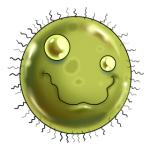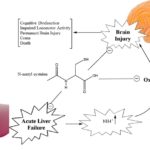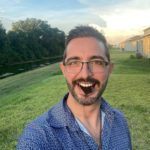How I Married Speech and Music Therapy: The Voice of Reason
My desire to play music gave me the drive that I needed to press on. I have said that music saved my life. But that is not really true… The amazing doctors, nurses, therapists and especially my mother saved my life… But music preserved my soul. Since I could wrap my ataxic (uncoordinated) left hand around the neck of a guitar, I had been attempting to play guitar again. I couldn’t play anything quickly or technical like I used to, in fact, it was difficult for me to even get a clean note at first, but this didn’t stop me from trying everyday.
Playing guitar was one thing, but singing was important to me as well, and I could hardly talk without exerting an enormous amount of energy, let alone sing. Soon after I had my tracheal surgery in August 2011, and could talk again, I was diagnosed with Dysarthria, or slurred speech. Speaking was extremely difficult for me. A brain injury survivor, whom I have recently befriended, put our shared experience the best when he said “it was like every word was a tongue twister.”
Speaking, for me, demonstrated the discombobulated and ineffective communication from my brain to my mouth… just like a tongue twister. If someone wants to say “Sally sells seashells by the sea shore”, the know exactly what they are meaning to say. One can repeat a tongue twister over and over in their minds without a hitch, but without practice, when one tries to repeat this out loud over and over, the communication between the brain’s instructions and the mouth’s execution usually gets tripped up somewhere along the line. Just as my new friend put it, it felt as if this would occur with EVERY WORD.
Playing guitar was also frustratingly hard, especially when it was a skill that I used to have. I couldn’t even pick up a glass using my left hand without spilling the contents, but I figured that if I could do something that required even more control, like playing guitar, those abilities would be gained as well… plus I wouldn’t spill liquid all over the place while practicing.
But talking was another extremely difficult task for me to overcome in order to communicate effectively. After being unable to talk for months, I really understood how incredible speech is. Our ability to communicate through speech is Humans first invention, and what an invention it is! Just as I had applied the quote by Brian Thomas Littrell to my hand, I applied the same quote to my speech: “Shoot for the moon, and if you miss, you’ll land among the stars.” Now I interpreted singing as being the moon and regaining my ability to talk effectively as being among the stars.
One of the songs that I would attempt to sing was “Rocky Raccoon” by The Beatles. One day while trying to play that song, it dawned on me how relevant the last verse of that song was to my current situation. The last verse takes place after Rocky gets shot. “The doctor came in stinking of gin and proceeded to lie on the table. He said ‘Rocky you’ve met your match’, and Rocky said ‘Doc, it’s only a scratch and I’ll be better as soon as I am able!'” In earlier posts, I have talked about how I was at least partially blind to the extent of my injuries. How “I didn’t know what I didn’t know.” How my false confidence gave me the drive to press on regardless of my inabilities. And, as dangerous as this delusional audacity was, it was and is certainly better than wallowing. Rocky and I shared this mentality.
The frustration involved in speaking, as well as the fact that I did not sound like me, was troublesome to me and my mother. Again, she was prioritizing the therapies that I needed because they were very expensive, and I had not yet been approved for any rehabilitative services. She came to my room one night with a print out of four word sentences for me to practice. These were sentences like “Can we go now?” or “It is over there.” She did not want my voice to get weaker while she found a speech therapist for me. I practiced the first three sentences and then threw the list away. I thought that I was so far passed that. “Mom, I’m singing songs!” I would declare like a teenager as if I was above it all. I remember saying something like “I am not going back to kindergarten when I am at a college level!” But I was just being a brat. I still work on enunciating even single words. I have Dysarthria and, even today, I need to think about how I talk so that the words are clear.
The day after my mom gave me the printout of four word sentences, I told her in my slow voice that the perfect speech therapist would also be a singer and vocal coach who could help me with both talking and singing. This was probably a pipe dream, but I figured that it is worth a shot to look. A day later, she had found Dara Allen. Dara is a singer, actor, vocal coach, and licensed speech language pathologist. She was exactly who I was looking for! Unfortunately, she didn’t usually work with brain injury. This is because all brain injuries are different, so there is too much uncertainty as to whether the client would be very hard to work with or not. My mom sent her my info and described my current mental state as, while a bit delusional, “pretty much on the planet.”
When I met Dara, she asked me a few questions just to get me talking. She asked me if my voice is different than it was before my brain injury and I told her that it is much slower and it takes way more effort to get the words out. “It is exhausting.” Concerning the pitch, I told her that “my voice is lower, but that’s ok.” She quickly interjected “no it’s not. Your voice is resonating in your throat, which is why you sound a little ‘rough and gravelly,’ but that’s not where you want your voice to resonate.” I loved the sound of the rough and gravelly voices of Tom waits, or Chuck Ragan (from Hot Water Music) so I asked “Why not?” She explained how “talking in the throat” or laryngeal/pharyngeal resonance is a resonance disorder that, not only takes far more effort, but that throat polyps can develop from. I was resonating incorrectly.
Again, because it was exhausting to even have a conversation, whenever someone would ask me a question or start a conversation with me, the first thing that went through my mind was “how can I end this conversation as soon as possible?” My resonance was incorrect, and I was also not breathing effectively. I breathed shallowly and ran out of air very quickly. This factor along with my throat resonance issue made Dara think that a Parkinson’s protocol would show itself to be effective for my recovery because this protocol helps the patient with breathing, air flow, glottal competence (vocal cord closure), resonance and articulation. Dysarthria, or slurred speech, encompasses all of these things.
To implement this protocol, however, she would need to see me for four days in a row, every week, for four weeks, and we did not have the time and resources for that, but she used many aspects of that protocol to help me. The first thing that I needed to improve was my breathing. She reminded me of diaphragmatic breathing. When this is done correctly, the chest and belly expand and a much deeper breath occurs. She gave me homework exercises like taking a big diaphragmatic breath and then holding a note as long as I could at a loud volume. I did this exercise five times a day. She also had me hold a note and go as high in pitch as I could. Then as low as I could. I would do these exercises every morning in the shower, and it must have been very annoying to John and my mother who weren’t used to these sounds of a Dysarthric young man belting tones as loud as he could and interrupting their previously quiet mornings.
Vocal exercises always felt goofy to me. I still always feel as if I should be on a stage in Vienna somewhere wearing a top hat, a bow-tie, and a monocle when I am working on a vocal exercise. Self consciousness went out the window a long time ago for me when I had a nurse bathing me and I occasionally had embarrassing bathroom accidents during my darkest five months after my brain injury. Now I live by the wise words that an old coworker used to say: “There ain’t no shame in my game!”
I can’t thank my mom and John enough for giving me the opportunity to reclaim my whole being. And also for tolerating the loud process that was necessary for me to get my voice back. “Think LOUD!” Is what Dara would tell me ever session. So I did. And they would try to tolerate it.
Dara also recognized that music was a huge motivator for me, so she had me do singing exercises with actual songs, as well as to sing my own songs. I know how bad my voice was at this point, and I feel terrible that my mom and John had to endure this torture. Despite my own uncomfortable feelings because my awful performance put others around me into an uncomfortable state, I felt that I HAD to try to sing everyday… And I wanted to. Several times, my mom or John would talk to me about how I could make things a bit more bearable for them. I would make some accommodations that I could because I understand how much it must have gotten on their nerves. I would not, however, limit my volume nor the daily frequency because the exercises effectiveness is dependent on both of these things. I have included examples of me singing and playing guitar before and at this point in my recovery as well as a recent recording below.
It is a good thing that I don’t have to do those loud and annoying exercises everyday (instead I sing) and it is noteworthy that working on the big issues like breathing and resonating really improved my articulation and speed. It is also incredible how much music lent to my motivation. And it was amazing to have found someone nearby who is so knowledgeable, open, caring, and helpful like Dara!
DEDICATED TO:
Dara W. Allen, B.M., M.S., CCC-SLP
Licensed Speech Language Pathologist
Austin Voice Institute
www.Austinvoiceinstitute.com
This song is of my old band where I sang and played guitar. This was recorded live before my brain injury.
This is that same song ten months after my brain injury (It is painful to listen to, but will give you an idea of where I was)




Comments
So is a connection to using probiotics because of I had a brain trauma accident and now have a skin problem that doesn’t go away with all these medications.? Please answer
Hi Patty! Check out this post for more about the gut/brain/skin axis: http://feedabrain.com/skin-in-the-game/